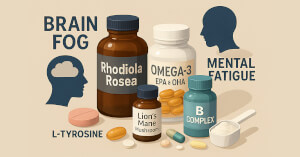
Rhodiola
Rhodiola is an adaptogen that enhances endurance, reduces fatigue, and supports mental and physical stress resilience.
Rhodiola (Rhodiola rosea) is a flowering plant that grows in cold mountainous regions of Europe and Asia. Traditionally used in Russia and Scandinavia, it's known for helping the body adapt to stress and combat fatigue.
Its active compounds, particularly rosavin and salidroside, may help regulate cortisol levels and support neurotransmitter balance. Rhodiola is often used to promote mental clarity, endurance, and resilience in stressful situations.
Rhodiola is taken for improving mood, energy, and cognitive function under stress. While many users report positive effects, more large-scale clinical studies are needed to fully confirm its adaptogenic benefits.
Other names & forms of Rhodiola supplement : rhodiola rosea, arctic root, golden root, rhodiola extract
Possible Benefits
Rhodiola offers well-rounded health benefits, particularly in managing fatigue, boosting focus, and supporting mood balance:
- Stress & Mood: Rhodiola has been shown to help the body adapt to stress and support a more positive mood, especially during demanding times.
- Energy & Endurance: This herb may enhance energy levels and stamina, helping reduce feelings of fatigue.
- Cognitive Health: Taking Rhodiola may improve mental focus and alertness under pressure. People often notice better clarity and memory during periods of stress.
- Anti-Aging: Its antioxidant compounds may help protect cells from damage, offering anti-aging support.
Side Effects
When you add Rhodiola to your regimen, it can be a great mood booster, but some people notice mild effects as their body adapts. Watch for:
- Lightheadedness or dizziness, especially if taken on an empty stomach
- Dry mouth or mild throat irritation
- Occasional jitteriness or overstimulation in sensitive individuals
- Headache or mild agitation if the dose is too high
- Possible insomnia when taken late in the day
Interactions
Possible interactions include:
- MAO inhibitors: Rhodiola’s monoamine-modulating compounds may interact with MAOIs (e.g., phenelzine), increasing risk of jitteriness or headaches.
- Stimulants and caffeine: Rhodiola can enhance stimulant effects; combining with caffeine-rich herbs like Green Tea Extract or medications like pseudoephedrine may heighten anxiety or insomnia.
- SSRIs and SNRIs: By influencing serotonin and dopamine, Rhodiola could potentiate antidepressants such as sertraline, raising the risk of serotonin-related side effects.
- Thyroid medications: Some evidence suggests Rhodiola may affect thyroid function; when used with levothyroxine, monitor thyroid panels for dose adjustments.
Precautions
Before relying on Rhodiola, make sure you don’t fall into any higher-risk categories. If so, check with a healthcare professional:
- Pregnant or breastfeeding women: Limited safety research; best to avoid or use under medical supervision
- Individuals with bipolar disorder: May trigger manic or hypomanic episodes; use only under psychiatric guidance
- People with high blood pressure: Rhodiola can cause temporary increases; monitor blood pressure closely
- Those taking stimulants or stimulatory herbs: Risk of excessive stimulation and palpitations; use cautiously
- Patients scheduled for surgery: Potential interaction with anesthesia; discontinue at least two weeks prior
Studies
These studies provide scientific insights into Rhodiola benefits:
A 2025 triple-blind, placebo-controlled crossover trial in healthy adults found Rhodiola rosea had only trivial-to-small effects on mental fatigue, visuo-cognitive processing, and perceived exertion versus placebo.
A 2024 systematic review reported that Rhodiola extract may improve cognitive function and mental well-being, but highlighted methodological limitations across RCTs.
A 2019 double-blind RCT in patients with mild-to-moderate depression showed 340 mg/day Rhodiola improved HAM-D scores by 37% versus 10% with placebo, indicating anti-depressive effects.
A 2023 14-day study found only a non-significant trend toward reduced perceived stress after Rhodiola administration, underscoring inconsistent stress-relief outcomes.
Disclaimer: This page is for educational purposes and does not replace medical advice. If you're pregnant, have a condition, or take medication, speak with a qualified professional.










